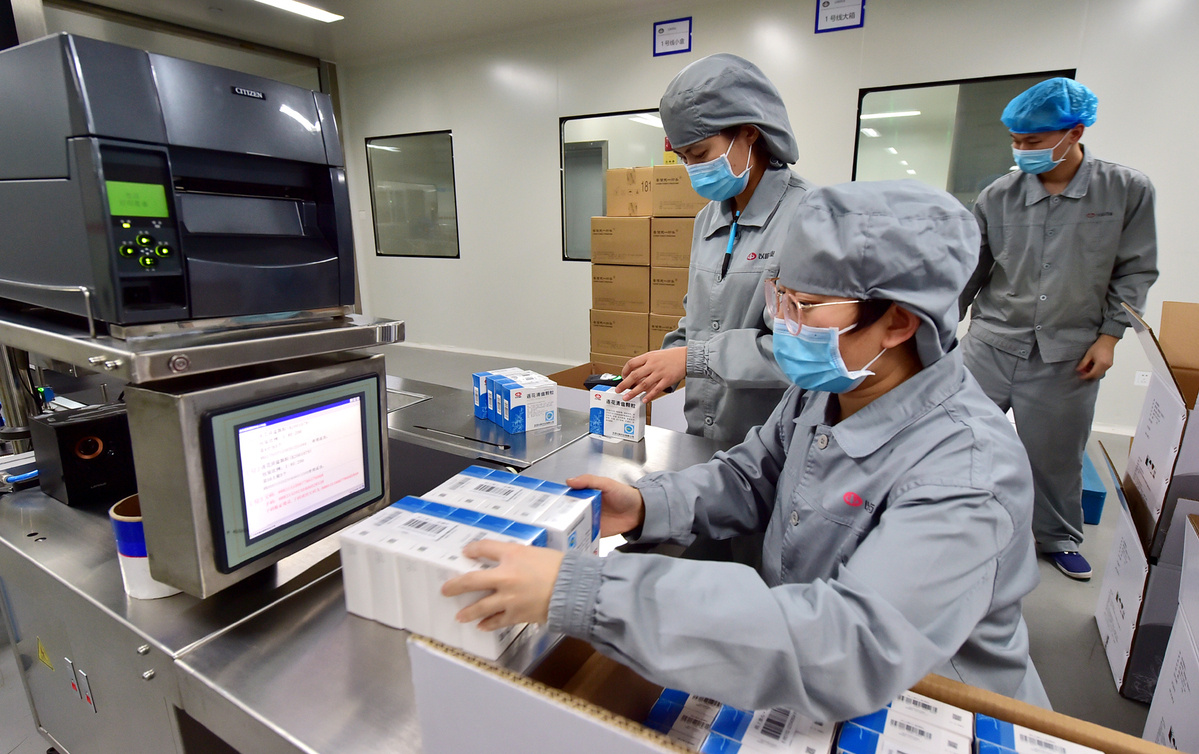
Employees pack Lianhuaqingwen capsules at a Shijiazhuang Yiling Pharmaceutical facility in Shijiazhuang, capital of Hebei province, on Jan 30. (Photo: Xinhua)
Traditional medicines sent to help COVID-19 control efforts overseas
In the global fight against COVID-19, while most Chinese manufacturers are stepping up efforts to provide medical devices, traditional Chinese medicine enterprises too are helping the world combat the pandemic.
TCM has proved to have a positive effect throughout the coronavirus prevention and treatment period, industry experts said.
Zhang Boli, an academician at the Chinese Academy of Engineering, said TCM had significantly reduced the proportion of patients with mild symptoms becoming severe cases.
As the global pandemic intensifies and becomes more complex, Chinese TCM enterprises are sending their products abroad while also maintaining sufficient domestic supply.
China Traditional Chinese Medicine Holdings Co Ltd, a subsidiary of Sinopharm Group, donated medical supplies worth 400,000 yuan ($56,800) to help fight the deadly contagion in Italy and France.
Tongjitang (Guizhou) Pharmaceutical Co Ltd, another unit of Sinopharm, donated two batches of preventive TCM worth a total of 135,000 yuan to France.
Shijiazhuang Yiling Pharmaceutical donated Lianhuaqingwen capsules worth 1.78 million yuan to aid Iraq in contagion prevention and control efforts. The compound herbal medicine has proved to be effective in treating COVID-19.
Meanwhile, Beijing Tong Ren Tang Chinese Medicine Co Ltd donated 4,000 doses of TCM to Singapore and Toronto. A total of 20,000 doses of its cold granules were delivered to Seoul.
The National Health Commission said that by the end of March, 91.5 percent of confirmed COVID-19 cases that used TCM treatment combined with Western medicine saw effective rates of over 90 percent.
"TCM treatment has become a bright spot of China's pandemic prevention and control," said Yu Yanhong, a member of the National Health Commission Party Leadership Group and Party secretary of the National Administration of Traditional Chinese Medicine.
At the end of March, Yiling's Lianhuaqingwen capsules received registration approval from the Thailand Ministry of Public Health, allowing the company to sell the products in the Thai market. Previously, it has obtained marketing authorization in Brazil, Indonesia, Canada, Mozambique and Romania.
However, exporting TCM as a contagion prevention and control remedy has not been without difficulties. Industry experts noted that in some countries where TCM is not recognized by local medical laws and regulations, such products are not allowed to be used in local hospitals. In such instances, TCM donated by Chinese firms has mostly been used as preventive treatment.
Zhang said that problems such as insufficient innovation and low-level duplication were the main reasons behind the difficulties with TCM internationalization.
"A scientific TCM standard that conforms to international standards needs to be established as soon as possible. Chinese herbs should be listed as national strategic resources that offer strong protection if developed and utilized in the proper way."
Meanwhile, standardized cultivation of Chinese herbs should be vigorously promoted to ensure a sustainable supply of TCM and help guarantee product quality and safety, Zhang said.
He said the fact that Lianhuaqingwen capsules were approved by the Thailand Ministry of Public Health represented a major industry breakthrough. "The major problem for TCM internationalization lies in legislation, as including TCM into local markets requires a country to amend their own codes, which is very difficult," he said.
"In addition, to raise the profile of TCM around the world is where we should make constant efforts. Now that TCM combined with Western medicine has proved to have an over 90 percent effective rate in treating novel coronavirus, it is a good time for us to build international credibility," Zhang added.
To prioritize the registration management of new drugs, including TCM, the State Administration for Market Regulation released a guideline on March 30. TCM registrations are categorized as innovative TCM, modified TCM or Chinese herbal medicine compound preparations, among others.
Chen Qiaoshan, a medical analyst at Beijing-based market consultancy Analysys, said: "With the introduction of more favorable policies, the TCM sector may find more development opportunities."


